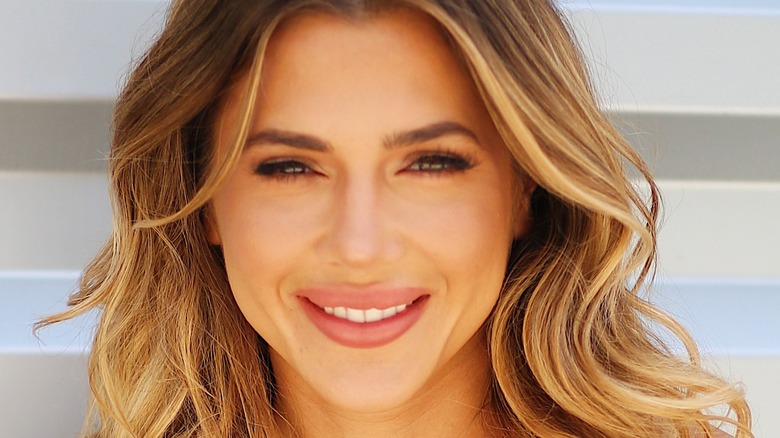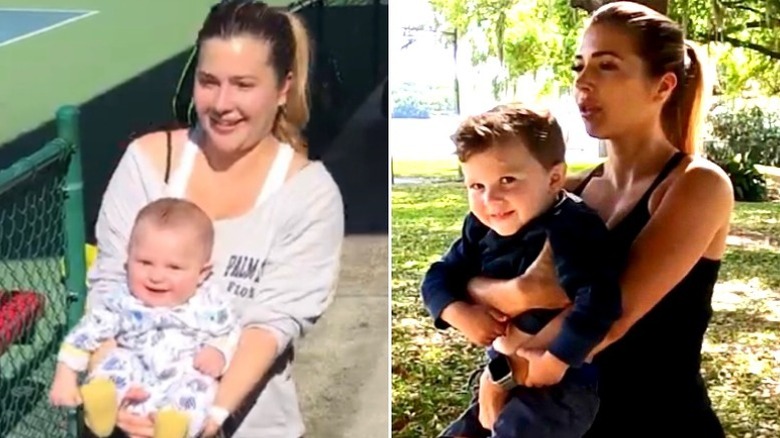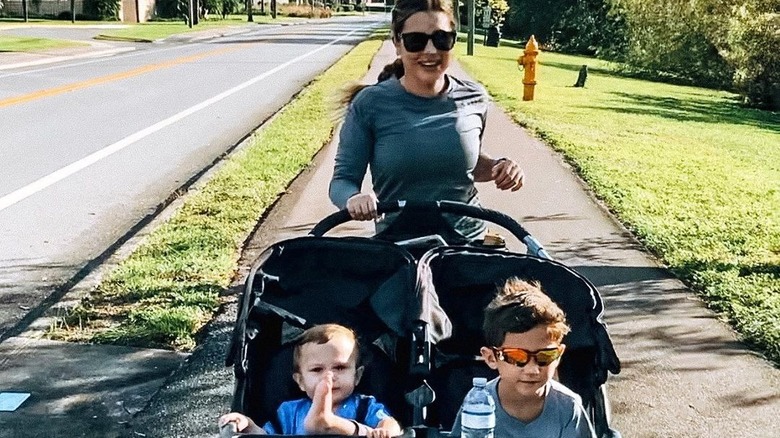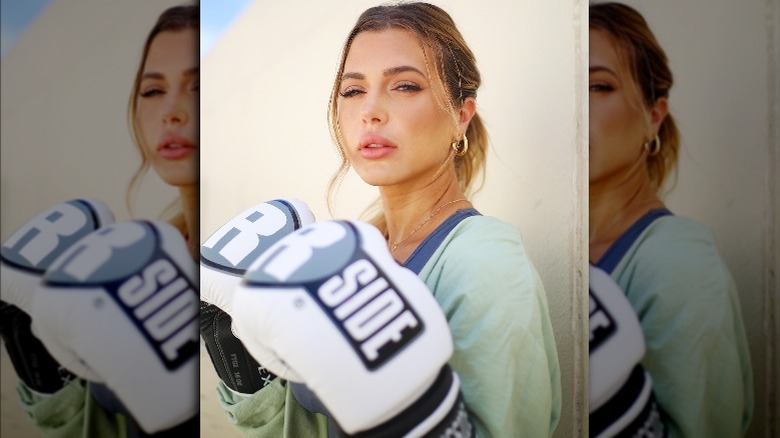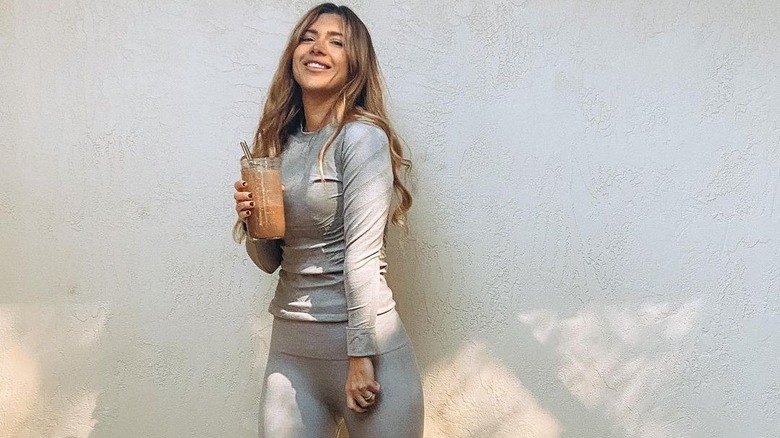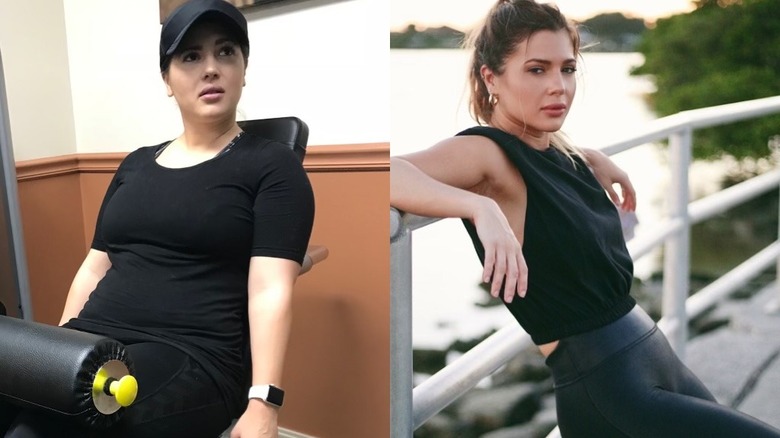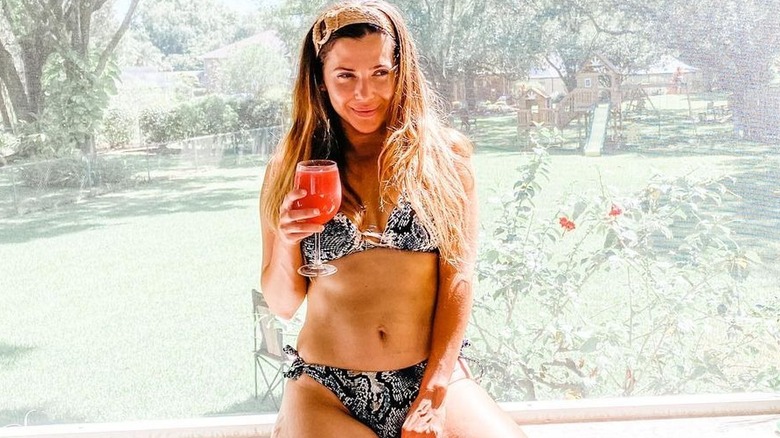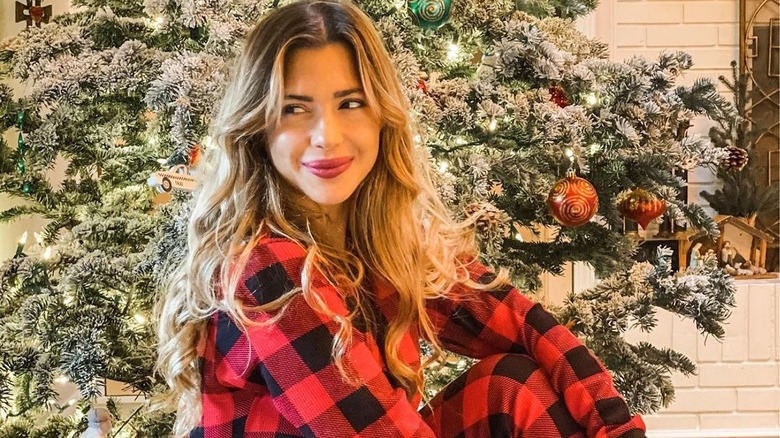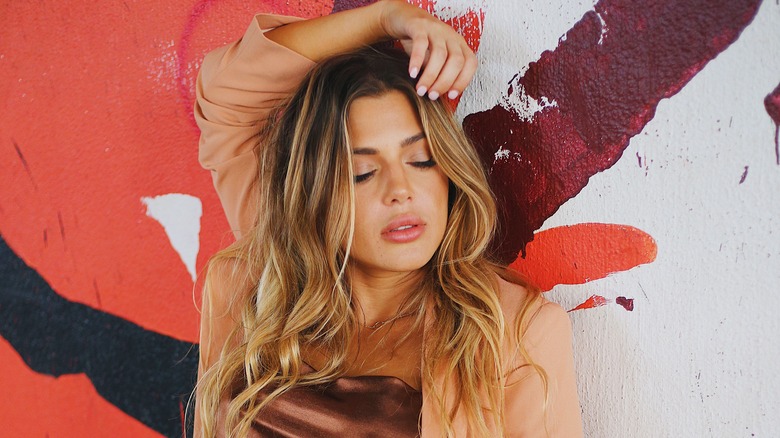Fitness Influencer Ali Kay Shares The Secrets Of Her Transformational Journey - Exclusive Interview
Ali Kay is a mother of two, a wife, and a small business owner, just like so many other women out there. She's also a fitness influencer who helps people transform their lives through her podcast, "Invest Your Best with Ali Kay," and her personal coaching business.
Ali started sharing her fitness journey on TikTok in March 2020, and caught viewers' attention immediately. An early video about her fitness transformation racked up hundreds of thousands of views, and each of her videos continued to reach tens of thousands of people interested in changing their lives through fitness. Then, in January 2021, one of her videos went super viral. The video, which documented how Ali had completely transformed in just two years, earned millions of views.
Ali came to realize that she has both the experience and the credentials — a master's degree in psychology and counseling — to help people on their own transformational journeys. She started her online coaching business to help people one on one, and a podcast so she could share her story in a more in-depth format.
Health Digest sat down with Ali to talk about her fitness routine, balancing family and self-care, mental health, and her newest self-care endeavor — going alcohol-free.
Fitness and parenting
You're a working mother, and your whole thing is these 30-minute workouts. So how is that working for you? Where do you fit that into your day?
So I gave birth to my second son over three years ... oh, gosh, it's three and a half years ago. I found myself 70 pounds overweight. I kept gaining weight postpartum, and I was just in a bad mental state. And I thought what I needed was this "weight loss journey." But it was more of this mindset, this shift in my mindset to just start bettering myself in all areas ... by moving my body, just going out and making that a priority.
And really, it just started with me pushing my son in the stroller. It was five minutes of walking — that's really physically all I could do. But I started looking forward to those five minutes every single day. Then those five minutes became 10 minutes and then 20 minutes and then the walking became jogging and then it became cycling and all that. So I became addicted to that feeling I got right away. And so just even to this day on, it's been three years [of] prioritizing that movement, that working out for 30 minutes makes such a difference mentally and physically in my life. So I prioritize it.
You've talked a lot about how you incorporate your kids into your workouts. I'm a mom of a two-year-old. I know it's really hard to get that workout in with the kiddos running around your feet. So what do you do to incorporate them or to work out around them?
I think the biggest thing is to have zero expectations. So going in there, thinking this is not going to be a perfect workout. Because I remember I was doing cycling, I had an indoor bike, the Peloton, [and] I would start it and then my four-and-a-half [year-old] would come in. I just got the baby down. ... He's like, "Mom, let's play dinosaurs." I'm like, "But I just started." And I had this expectation that I was going to get this perfect workout. It'd be from start to end. And that would be it — and it's not.
So I think the first thing is just to drop those expectations and really just set a time for yourself, whether it's 10 minutes, 20 minutes, 30 minutes. And just follow through with that time, because you are going to have to stop. You are going to have to break up the fights between the kids and stuff and then start again. But what I found is ... my son's three now, he'll start squatting with me. So it has evolved where they want to do it with me now. But I think the biggest thing is to have zero expectations.
Talking to kids about fitness and food
[Your kids are] getting to the age where you're probably talking to them about bodies and healthy habits and movement. How are you framing that for them given this major change that you've made in your life?
Yeah. I think the biggest thing that I show them is, like, "Mommy's got to go run for her mental health. Mommy needs this time." And I think even in society, especially as us moms, it's a good thing to be selfless, not to put ourselves first. So I'm really saying, "Look, guys, mommy is just feeling a little down. I'm going to go run and make it better." And sometimes even ... my son — [he's] turning eight on Monday, gosh — but he'll come run with me too. And I'm like, "Look, we're going to feel better."
Sometimes when he's frustrated, I'm like, "Let's go run around the neighborhood." So I am incorporating that and showing them, and they know, we talk about certain foods like, "This food is really going to fuel our bodies." Especially with my eight-year-old, I think he's really catching on to that concept of which foods have protein and that fuel that our bodies need. So it's giving that light and that perspective to foods too.
Joyful movement and avoiding shame
You recently did [an episode of "Invest Your Best"] about the importance of joyful movement, because working out for a lot of people becomes a slog of like, "Got to go to the gym, got to get on the treadmill." So what do you do to incorporate more of that joyful movement?
Yeah, I don't know why but I feel a lot of us perceive working out — and I'm guilty of this too — [as] almost like punishment. Like we have to do this. So I talk about finding something that you actually enjoy. And like I said, what I enjoy, the movement I enjoy, might be different than what you enjoy. So it could be dancing in your family room and maybe that's it. Just like moving that way.
People love to be outdoors. I know I love my workouts outdoors, but it's really having that perception that this is going to help me feel mentally better and change that mindset. And that it's not just for physical health. It's not just for body image. It's not just for weight loss. It's really for mental health. So it's really framing that too and seeing it that way.
Absolutely. And to just jump right off of that, I feel like a lot of people's journey with movement — working out, exercise, whatever mindset you approach it with — a lot of it has to do with shame. Like beating ourselves up for not making the workout or, like, "Oh, I didn't get my minutes in today," or "close my rings," or whatever it is. How do you avoid that negative self-talk in your movement program?
I think the biggest thing is being aware of it. That's the first thing. Like, what you're telling yourself. Are you giving yourself grace? And even to this day, I have to catch myself, give myself grace. It's okay. You can do it.
And another thing is starting small. I feel like, especially in my journey, it wasn't this, like, "Okay, tomorrow I'm going to do this six-week program where I eat clean and I'm going to work out every single day." And that's coming from doing absolutely nothing. So it's really just those small habits, like the five minutes of going outside and building upon that. Really, it's setting yourself up for success and starting those small habits to build a sustainable lifestyle. And all things take time.
My journey has been over a year and a half, and it's a continuous journey. So it's also realizing that it's never over. It's just putting in the effort every single day. And it could be — one day might be good, one day might be bad, but you just keep pushing forward.
Mindful eating and finding balance
One of the things I noticed about your practice and your relationship to food is that you have a really big focus on mindful eating instead of ... I mean, there's a thousand recommendations of how to have a healthy relationship with food. Why is mindful eating so important to you?
So definitely in the beginning, when my goal was to lose the weight and feel more like myself, I did a lot of trial and error. I tried, "Okay, I'm just going to eat clean foods and take away the processed food." Or, "I'm going to do intermittent fasting where I can't eat from this time and that time." And that just wasn't sustainable for me.
I also think when we have that perspective of like, "We're on a diet," that means that it's almost like we're deprived — and I feel it makes it worse. We want it more because we can't have it. So that's really where I came with the small and steady changes and, yeah, that took time. It wasn't this quick fix or instant gratification, but the biggest thing is that it builds a sustainable lifestyle.
So what I've learned being mindful, intermittent fasting doesn't work for me because I run ... at 9:00 at night, I'm still hungry because my body needs that. So it's tuning into your body and really understanding, 'Am I hungry? Am I thirsty?' And I think that's just been really sustainable for me. And, hey, I have pizza and all the things. So I'm just tuning into that. And I've also learned when I do eat pizza all the time and all that, I feel sluggish. I'm being aware of that too — how certain foods affect me mentally and physically.
Mental and physical transformation
One of the things you talk about a lot is the changes in your body and in your mental health, from just changing your relationship to health. So give us a picture: What was your health like before you did this and what is it like now? Mental and physical.
So before I started this, I was living the pregnancy lifestyle post-pregnancy. I'm talking, I was eating bigger portions than my husband, all that kind of stuff. I could out-eat him and I was just eating anything and everything. But I was also very negative towards myself. I didn't even look at myself in the mirror. I was against myself, meaning I was like, "What do you do? You can't do this." I was just against myself and that side. And then I think the biggest shift was getting on the same side as myself and giving myself grace, like, "Look, it's okay. Your situation is not permanent. This is a temporary thing. And you have the power to change it." And accepting that like, "Look at you, it's okay, love and accept yourself."
I think now there's more of that acceptance and that grace and it goes back to even if I don't have the healthiest day, that's okay. I give myself grace and I move forward. So I think the biggest thing has been the whole mindset and the inner self-talk, getting on the same side of myself to encourage myself and accept myself and telling myself that I can do it too.
Absolutely. And what are some ways that you see that show up in your day-to-day life that it didn't before?
Ali Kay: Before I started even just moving my body and making that a priority, I will tell you I was moody. I was not patient. I lost my patience a lot with my kids. I feel like I was having more funk days than I was having good days. I also think I didn't really have the confidence to believe in myself to do things I truly wanted to do. And even six months into my whole journey of just investing in my best self, I started a small business. I had no idea what I was doing. If I hadn't started that journey, I would've never had the courage to do what I did.
And even talking to you right now — I wouldn't have had that confidence. And just like that — just the confidence in myself too, and the resilience to stress — I feel I am much more resilient to stress and I even feel it on the days I don't get the movement in. I am the moody person. I do feel I'm stressed out and all it takes is moving my body and giving myself that time. So those are probably the biggest changes.
Giving up alcohol
I definitely want to talk about your alcohol-free journey. I'd like to hear more about that decision, how the journey has been.
Yeah. So I feel like a lot of people, especially during COVID — I was homeschooling my son who was in kindergarten at the time, we were all home locked in and that cocktail hour became the new norm every single day. And I didn't like it. I was like, "I don't like this lifestyle." And someone recommended the book, "This Naked Mind” by Annie Grace. And this was a year ago and I had her on the podcast. I read the book [and] I interviewed her on the podcast and she really talks about the relationship between society and alcohol, that you might not realize how everything revolves around alcohol. So ... for the past year, I've kind of just been aware of this.
I'm not someone who pours myself a glass of wine every day during the week. I'm more of that social drinker, but on the weekends I'm hungover, the next day I'm hungover. It trickles into my week. I'm not my best self. So it's really that question of "Is this bringing me closer or further away to my goal?"
About 117 days ago — it's been 117 days! — I found myself going out one night of the week with my mom and my sister. I had like five or six drinks. I was hungover and I took a video myself and I'm like, "I don't want to feel this way anymore. This is not bringing me closer to my goals. I don't want to be this for my kids. I don't want them to see me this way. Alcohol isn't adding anything to my life." And that's just when I decided to go alcohol-free, but I don't want to say, "I will never drink again." I don't want to put that pressure on myself. I'm just enjoying the journey and really liking doing this.
What's changed for you since you've done this little alcohol-free experiment?
So I will be completely honest with you. It's not all good. There's bad stuff too. So I'll just highlight the good. Every morning, I don't have that anxiety of like, "Oh my gosh, am I hungover? Am I going to feel really bad today?" Every day I wake up clear-minded. I used to wake up even after a glass of wine at like 3:00 AM with that anxiety. No more of that. I feel like I'm more productive during the weeks.
I've really shifted my weekends to being a time of productivity rather than laying on the couch and eating McDonald's and just doing nothing. Weekends have shifted to that, but the bad things are not so bad. I think ... more of the hard part that I'm navigating is holidays without alcohol. Socially, how to handle saying, "I'm not drinking." And going about that. And I've noticed I'm getting invited less and less because people assume, "You're judgy because you don't drink." And that's not really the case. Or people ask, "Are you an alcoholic?" because you chose to be alcohol-free. So it's just navigating this new life, but definitely more pros than cons.
Alcohol-free holidays and gatherings
Have you gotten into mocktails [since going alcohol-free]?
Yes. So that has been like a huge thing. I will be honest with you. I was never into mocktails before, because why have a mocktail when you can have a real thing? But there's a lot out there. There's alcohol-free beer that tastes good, [Curious] Elixir makes booze-free cocktails in bottles. So one thing I've learned is, I'll bring my own alcohol-free drinks with me to the party and I'll just crack one open and have it in my hand. And no one asks if you're drinking or not drinking. So that's kind of been my safety net.
I think that's a really important message to get out there during the holidays.
Yeah, exactly. And I also found you don't have to announce like, "Hey, I'm not drinking." Because that's when people are like, "Why aren't you drinking? You have to drink. Oh, you're not fun." So I've learned not to announce, "I'm not drinking," and to have my own drinks.
Coming up on 'Invest Your Best with Ali Kay'
One of the biggest things that your story has been about [is your] weight loss journey, but I'm wondering, from your perspective, is there a more important thing that you focus on than that weight loss?
Yeah. I feel now, especially, this is the reason why I started the "Invest Your Best" podcast. I think I initially started this thinking this was a weight loss journey and I'm just going to cross a finish line and that's it. I reached a number on this scale and I found that it was much more than that. And I think overall my goal is to just invest in my best self mentally and physically. And that's why I keep sharing my journey.
Right now I decided to go alcohol-free. This is the next step of my journey. The journey is never over. And I think that's really what it is — it's just to be my best mentally and physically. So it's way more than just weight loss.
That's great. So, tell us more about the podcast.
Yeah, so the podcast is called "Invest Your Best with Ali Kay." It's all about how to live your best life, mentally, physically, and spiritually, really focusing on what we can control, which is our thinking and our actions. So my whole thing is, I'm on this journey. I do not have it all figured out. So I'm very mindful of the guests I bring on. We had Annie Grace, the author of "This Naked Mind." I talked to people who are big in the fitness world, moms, mental health advocates, just all around those types of people in that space. And I also share from my personal life what I feel would help other people to know they're less alone or that they can relate to the story.
Absolutely. So what are you hoping to bring to people who are listening to [Invest Your Best]?
My biggest thing is to just learn that prioritizing you, prioritizing your mental and physical health, is everything to just go about life. When we give the investment to be our best self, then we can give our best self to our family, our kids, others, our work, our jobs, everything. So it's really prioritizing you.
Can you give us any sneak peeks for the podcast?
Yeah. So the biggest thing is, we are coming up on a two-week alcohol-free challenge that I will be talking a lot more about. It's starting January 3rd. And I want to say alcohol-free rather than "sober," just because sober has associations with it. But the biggest thing going into January, I think I am going to be sharing more about that alcohol-free journey and really providing that support and that accountability with a group. And even if people don't want to give up alcohol for the long term, this is a great way to just restart your relationship with alcohol or take that break after the holidays and have a group of people. It's amazing how many strangers will support you in a group. Especially like-minded people all working towards the same goal.
Keep up with Ali's journey by listening to "Invest Your Best with Ali Kay" on Apple Podcasts and follow her on Instagram, TikTok, and YouTube for additional tips on how to invest in your best.

